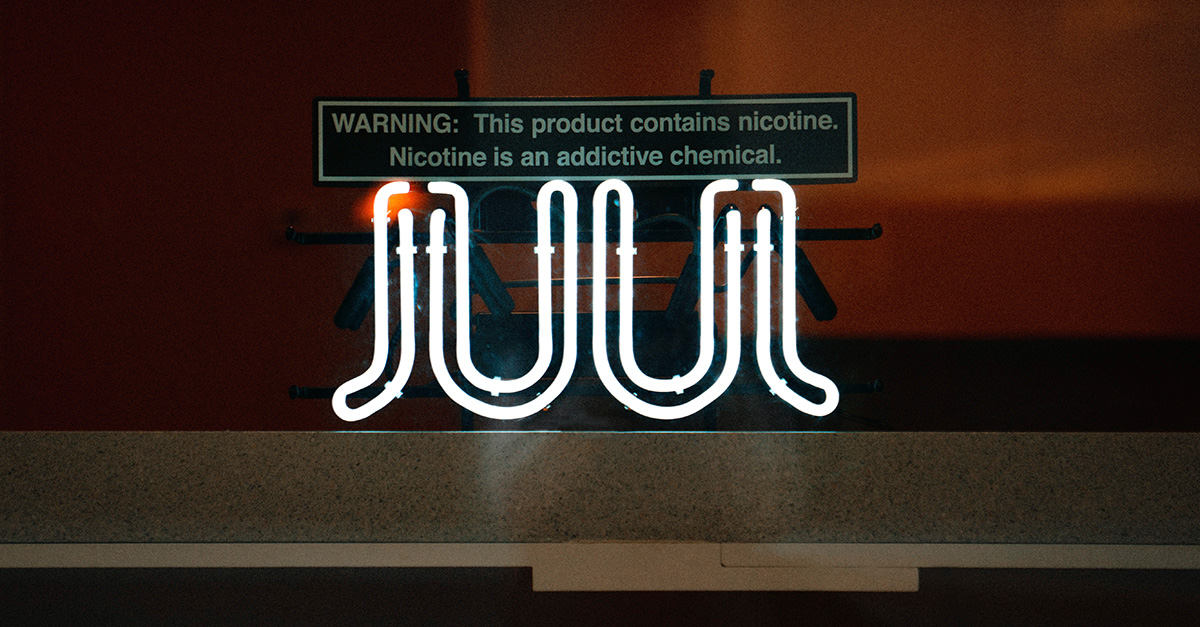JUUL spends more than double on corporate responsibility advertisements compared to youth prevention efforts
The popular e-cigarette maker JUUL spent upwards of $75 million over two years on ads promoting their corporate social responsibility mission, vastly exceeding their $30 million investment in underage use prevention efforts, according to a new study by Truth Initiative® and the National Opinion Research Center.
The study published in Tobacco Control also finds that one of JUUL’s prevention campaigns “What Parents Need to Know about JUUL” primarily advertised JUUL’s smoking reduction “mission,” promoted the product and did not appear to be designed to educate parents on the health risks of vaping or nicotine addiction. The research highlights the tobacco industry’s efforts to overhaul its reputation as it recruits a new generation of tobacco users.
Researchers reviewed JUUL Lab’s newspaper, magazine, radio, internet and mobile web marketing expenditures that were tagged as “corporate promotion” in the largest media markets in the U.S. from 2018 to 2019. They found that JUUL spent $30 million on corporate promotion in 2018 and $45.9 million in 2019, greatly exceeding the amount it budgeted for underage use prevention efforts. JUUL also likely spent more than the estimated $75 million on corporate promotion, given that the estimate excludes advertising through social media, sponsored events, retail advertising, or internet promotions not paid for directly by the company.

Intentional targeting of geographic areas and online platforms
JUUL dedicated approximately 45% of corporate promotion ad expenditures in 2019 to Washington, D.C., Chicago, and Boston, media market areas where health organization and legislative officials were launching investigations into JUUL social media and other promotional strategies. “One possibility is that JUUL focused their spending in these areas primarily to target policy-makers,” the authors write.
They also shifted marketing to online platforms: advertising categorized as corporate promotion on mobile web increased by 22,831% from $12,036 to over $2.76 million between 2018 and 2019. Internet display expenditures increased by 11,288% between 2018 and 2019, from $35,349 to more than $4 million.
Ad campaign claiming to educate parents didn’t
In response to public outcry about youth vaping - about one in five high school students using e-cigarettes in 2020 – JUUL Labs announced a three-year $30 million investment in April 2018 to combat underage use through “independent research, youth and parent education and community engagement.”
JUUL’s advertising campaign “What Parents Need to Know about JUUL,” which ran predominantly in 2018, did not appear to be designed to educate parents on the health risks of vaping or nicotine addiction or delivered in a way to reach parents. Researchers found that the ads primarily advertised JUUL’s smoking reduction “mission” and promoted the product in 2018 and went on to feature messaging on raising the minimum age of tobacco use to 21 and using JUUL to switch from combustible cigarettes in 2019.
A throwback to cigarette marketing strategy
JUUL’s ads claim that they self-regulate and are not targeting youth, a messaging strategy consistent with Philip Morris ads for cigarettes in the early 2000s. Philip Morris’ “Action Against Access” ads in 2000 touted the tobacco industry’s efforts to crack down on youth access to cigarettes, a message reflected in JUUL’s 2019 ads promoting secret shopper visits to curb youth vaping. The ads are consistent with tobacco industry tactics – exposed in the Truth Initiative report “Spinning a New Tobacco Industry” – and appear to be an attempt to rebrand the company and counter negative publicity.
The need to closely watch tobacco advertising
JUUL spent millions more on “corporate promotion” compared to efforts to prevent youth use. Ads claiming to educate parents about the harms of vaping didn’t do so, and JUUL’s ads reflect the spirit of cigarette ads of previous generations that tout the tobacco industry’s role in cracking down on youth access. Findings underscore the need for close scrutiny of the tobacco industry’s advertising strategies that position them as public health advocates rather than manufacturers of a highly addictive product.
Results also highlight the need for the Food and Drug Administration to exert its full authority to regulate e-cigarettes. FDA has taken action against some of the e-cigarette products most blatantly advertising in a way that appeals to youth, but through a piecemeal, reactive approach. For example, in July 2020, FDA sent warning letters to seven manufacturers ordering them to remove their flavored disposable e-cigarettes from the market because their marketing was targeted to youth or likely to promote use by youth. But these sporadic actions have not resulted in the removal of the myriad products that clearly target youth.
FDA has indicated that it will impose restrictions on social media marketing and encourage e-cigarette advertising to be aimed at adults. It is critical that these restrictions are put in place prior to any product being authorized for sale in the U.S.
More in emerging tobacco products
Want support quitting? Join EX Program
By clicking JOIN, you agree to the Terms, Text Message Terms and Privacy Policy.
Msg&Data rates may apply; msgs are automated.



